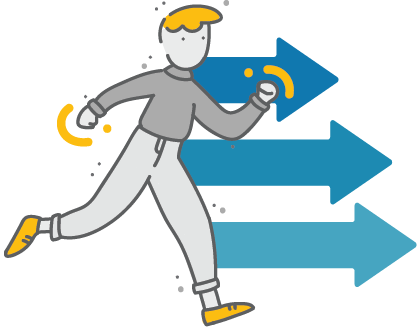Symptom Areas
Headaches
Updated Aug 2, 2019
Swipe right to go to the next slide
Headaches are one of the most common symptoms following a concussion. There are several common types, with varying symptoms and locations. Most headaches are not from a dangerous cause, nor do they cause damage to the brain.
There are medication and non-medication options that often help. We will discuss these options in this article.

Headaches are usually categorized based on their symptoms and location, such as either migraine or tension headache. Daily headaches can also be caused by taking certain headache pain medications too often. The type of headache determines the treatments that are usually effective. Headaches very rarely require urgent medical attention.
For more information about your headache, you can talk to your family doctor
Common headache triggers include dehydration, stress, poor sleep, neck pain, and/or overstimulation. Poor sleep can also make headaches worse. The next slide lists some strategies to help. Figuring out a solution that works for you often takes time and practice.
Some triggers (e.g., stress) are very hard to avoid. Practicing dealing with or getting used to such triggers may be a better option than going to great lengths to avoid them.
If you are experiencing high levels of headache triggers such as stress or anxiety despite using self-management strategies, you may need further guidance from your family doctor.
Identifying your headache triggers early and using some of the following strategies can help reduce the frequency and severity of your headaches. Don’t wait for your headaches to get bad!
Self-management strategies for headache include:
For more information on managing your headaches, please see the Living Concussion Guidelines patient guidelines [website].
Keeping and taking a headache diary will help you and your family doctor better understand the type of headache you have. Make a note of these in your diary and take it to your doctor’s appointment:
You can print a copy of the tracking sheet from the Living Concussion Guidelines [pdf].
Medications for headache fall into two main categories. One category of medications stops a headache once it has started (also called “rescue medications”) and the other category of medications prevent headaches from starting (preventative medications).
Common rescue medications include acetaminophen , ibuprofen , and “tryptan” medications. Using them can help reduce headache severity and improve how you function. These medications should not be used on a daily basis for very long periods (many months).
Preventative medications are used when headaches occur frequently. They are taken every day, even if there is no headache that day. Your family doctor can help you to decide whether a preventive medication is right for your headaches.
For more information on headache medications, please see the section on “What medication my doctor may prescribe” of the Living Concussion Guidelines [pdf].
Headaches resulting from concussion usually improve with time.
If you find your headaches are not improving with the use of self-management strategies, speak to your family doctor. They may review medications, refer to a specialist, or explore other treatment options in partnership with you.

Click the button above to toggle between light mode and dark mode. This toggle can also be found in the menu.
Hold
and tap
to zoom in.
Hold
and tap
to zoom out.
Hold
and tap
to zoom in.
Hold
and tap
to zoom out.
On most mobile devices, you can spread to zoom.
Increase your text size in your device settings.
Remember to take regular breaks while exploring MyGuide: Concussion.
Vancouver Coastal Health’s MyGuide Concussion Team would love to hear your feedback! It matters to us and helps to improve the experience for future users. Your responses will be kept anonymous and your privacy is a top priority. To complete a 15-20 minute online survey or request a telephone survey, please click the link below.